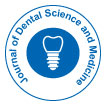Notre groupe organise plus de 3 000 séries de conférences Événements chaque année aux États-Unis, en Europe et en Europe. Asie avec le soutien de 1 000 autres Sociétés scientifiques et publie plus de 700 Open Access Revues qui contiennent plus de 50 000 personnalités éminentes, des scientifiques réputés en tant que membres du comité de rédaction.
Les revues en libre accès gagnent plus de lecteurs et de citations
700 revues et 15 000 000 de lecteurs Chaque revue attire plus de 25 000 lecteurs
Indexé dans
- Recherche de référence
- Université Hamdard
- EBSCO AZ
- ICMJE
Liens utiles
Revues en libre accès
Partager cette page
Abstrait
Dental Implant Failure as a Risk Factor for Selective Serotonin Reuptake Inhibitors: A Study of Clinical History
María Quintanilla
Antidepressants, particularly selective serotonin reuptake inhibitors (SSRIs), have seen an exponential rise in popularity in recent decades in Europe and the United States. This retrospective study wanted to find out if there was a link between taking SSRIs and dental implant (DI) failure or survival, and secondarily, how other systemic and local factors affected it. The STROBE (Strengthening the Reporting of Observational Studies in Epidemiology) observational study guidelines were followed in this retrospective cohort study. 573 DIs were given to 170 patients altogether. The reported failure rate for DI was 6.11 percent. 18.31 percent of these failed in patients who were prescribed SSRIs, while 4.38 percent failed in patients who were not. In particular, the multivariate analysis revealed 3.70 times higher adjusted risk and a 4.53 times higher hazard ratio for DI failure when these drugs were used. These patients also had a lower rate of DI survival at 90 months compared to those who did not take them. With the restrictions of the current review, it tends to be certified that there is a connection between the admission of SSRIs and DI disappointment, as well as a lower endurance rate in these patients.
Revues par sujet
- Agriculture et Aquaculture
- Biochimie
- Chimie
- Food & Nutrition
- Génétique et biologie moléculaire
- Géologie et sciences de la Terre
- Immunologie et microbiologie
- Ingénierie
- La science des matériaux
- Le physique
- Science générale
- Sciences cliniques
- Sciences environnementales
- Sciences médicales
- Sciences pharmaceutiques
- Sciences sociales et politiques
- Sciences vétérinaires
- Soins infirmiers et soins de santé
Revues cliniques et médicales
- Allaitement
- Anesthésiologie
- Biologie moléculaire
- Cardiologie
- Chirurgie
- Dentisterie
- Dermatologie
- Diabète et endocrinologie
- Gastro-entérologie
- Immunologie
- La génétique
- Maladies infectieuses
- Médecine
- Microbiologie
- Neurologie
- Oncologie
- Ophtalmologie
- Pédiatrie
- Recherche clinique
- Soins de santé
- Toxicologie

 English
English  Spanish
Spanish  Chinese
Chinese  Russian
Russian  German
German  Japanese
Japanese  Portuguese
Portuguese  Hindi
Hindi